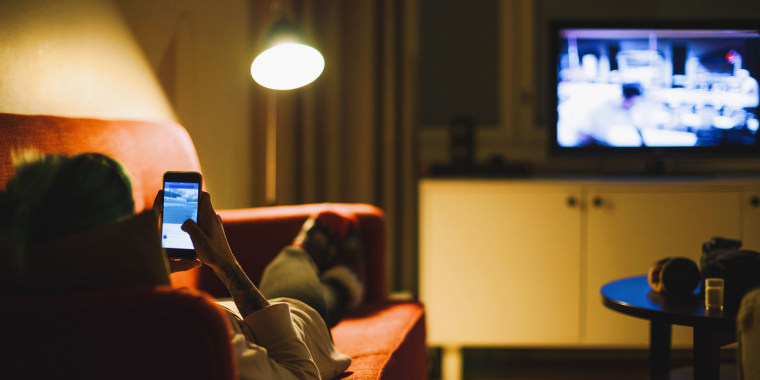Armed with a remote in one hand and a phone in the other, TV viewers are now often multitasking — watching a show and tweeting about it at the same time.
But if you really want to escape reality and immerse yourself in the story, put the phone away, the authors of a new study advised.
People who live-tweeted a TV show enjoyed it less than other viewers because such multitasking reduced their ability to be “transported” into the plot and be completely absorbed by it, according to the paper published in the Journal of Broadcasting & Electronic Media.
“This kind of behavior is encouraged by the television and movie industry because they’re thinking about it in terms of user engagement. But user engagement may not necessarily translate into enjoyment,” co-author Saraswathi Bellur, an assistant professor of communication at the University of Connecticut, told TODAY.
“Just because you’re engaged doesn’t actually mean you may actually enjoy the show.”
More than half of people who are 18-24 years old use a “second screen” — a phone connected to social media — while watching TV, research has shown.
The study was based on responses from 230 college students who were 19 years old on average.
All of them watched an episode of “Friends” while being randomly assigned to one of two groups: people in the first group simply watched the show, while people in the other were asked to send at least five tweets about the show while watching.
Afterwards, they filled out a questionnaire about their level of “transportation,” emotions and enjoyment.
The concept of transportation is one of the big reasons why people read books, watch TV or go to the movies, Bellur said.
“We feel as though we’re transported elsewhere. That’s the fascination with media: For a moment or for a couple of hours, we feel as though we’re somewhere else because the narrative is so immersive,” she noted.
It turned out people who were live-tweeting experienced lower levels of transportation, and fewer positive and social emotions, which, in turn, led to lower levels of enjoyment of the show, compared to people who just watched the episode.
Voluntary interruptions — like typing a tweet — prevent people from closely following the plot and therefore rob them of the enjoyment of watching the show.
“Multi-tasking is a myth. We don’t really multi-task, we just switch between tasks really quickly,” Bellur said. “The primary task usually suffers.”
Bellur believed the findings would apply to people in all age groups. The next step is to test whether live-tweeting would also lessen the enjoyment of TV shows without a narrative, like a news program, sports event or an awards show.
Her advice to people who really want to immerse themselves in a TV show and closely follow the plot: Skip the live-tweeting. Or just pause the episode if you really, really feel the need to tweet.
It's not the first time social media has been blamed for ruining the enjoyment of a leisure activity. Some complain Instagram travel bragging is killing the family vacation as the social pressure to take big trips can add stress to something that’s supposed to be relaxing.

